OCZ Vector (256GB) Review
by Anand Lal Shimpi on November 27, 2012 9:10 PM ESTAnandTech Storage Bench 2011
Two years ago we introduced our AnandTech Storage Bench, a suite of benchmarks that took traces of real OS/application usage and played them back in a repeatable manner. I assembled the traces myself out of frustration with the majority of what we have today in terms of SSD benchmarks.
Although the AnandTech Storage Bench tests did a good job of characterizing SSD performance, they weren't stressful enough. All of the tests performed less than 10GB of reads/writes and typically involved only 4GB of writes specifically. That's not even enough exceed the spare area on most SSDs. Most canned SSD benchmarks don't even come close to writing a single gigabyte of data, but that doesn't mean that simply writing 4GB is acceptable.
Originally I kept the benchmarks short enough that they wouldn't be a burden to run (~30 minutes) but long enough that they were representative of what a power user might do with their system.
Not too long ago I tweeted that I had created what I referred to as the Mother of All SSD Benchmarks (MOASB). Rather than only writing 4GB of data to the drive, this benchmark writes 106.32GB. It's the load you'd put on a drive after nearly two weeks of constant usage. And it takes a *long* time to run.
1) The MOASB, officially called AnandTech Storage Bench 2011 - Heavy Workload, mainly focuses on the times when your I/O activity is the highest. There is a lot of downloading and application installing that happens during the course of this test. My thinking was that it's during application installs, file copies, downloading and multitasking with all of this that you can really notice performance differences between drives.
2) I tried to cover as many bases as possible with the software I incorporated into this test. There's a lot of photo editing in Photoshop, HTML editing in Dreamweaver, web browsing, game playing/level loading (Starcraft II & WoW are both a part of the test) as well as general use stuff (application installing, virus scanning). I included a large amount of email downloading, document creation and editing as well. To top it all off I even use Visual Studio 2008 to build Chromium during the test.
The test has 2,168,893 read operations and 1,783,447 write operations. The IO breakdown is as follows:
| AnandTech Storage Bench 2011 - Heavy Workload IO Breakdown | ||||
| IO Size | % of Total | |||
| 4KB | 28% | |||
| 16KB | 10% | |||
| 32KB | 10% | |||
| 64KB | 4% | |||
Only 42% of all operations are sequential, the rest range from pseudo to fully random (with most falling in the pseudo-random category). Average queue depth is 4.625 IOs, with 59% of operations taking place in an IO queue of 1.
Many of you have asked for a better way to really characterize performance. Simply looking at IOPS doesn't really say much. As a result I'm going to be presenting Storage Bench 2011 data in a slightly different way. We'll have performance represented as Average MB/s, with higher numbers being better. At the same time I'll be reporting how long the SSD was busy while running this test. These disk busy graphs will show you exactly how much time was shaved off by using a faster drive vs. a slower one during the course of this test. Finally, I will also break out performance into reads, writes and combined. The reason I do this is to help balance out the fact that this test is unusually write intensive, which can often hide the benefits of a drive with good read performance.
There's also a new light workload for 2011. This is a far more reasonable, typical every day use case benchmark. Lots of web browsing, photo editing (but with a greater focus on photo consumption), video playback as well as some application installs and gaming. This test isn't nearly as write intensive as the MOASB but it's still multiple times more write intensive than what we were running in 2010.
As always I don't believe that these two benchmarks alone are enough to characterize the performance of a drive, but hopefully along with the rest of our tests they will help provide a better idea.
The testbed for Storage Bench 2011 has changed as well. We're now using a Sandy Bridge platform with full 6Gbps support for these tests.
AnandTech Storage Bench 2011 - Heavy Workload
We'll start out by looking at average data rate throughout our new heavy workload test:
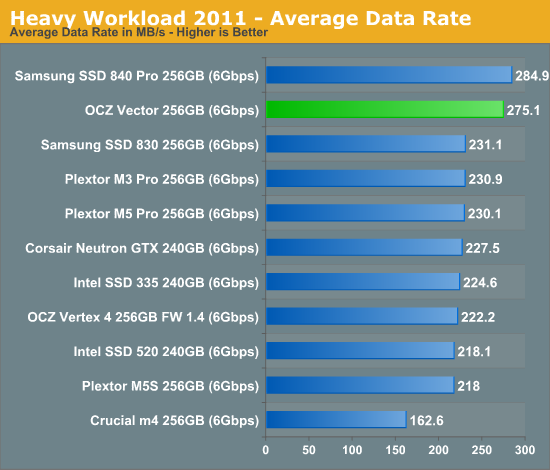
Here it is. OCZ's Vector comes within 4% of Samsung's SSD 840 Pro and manages a 22% increase in performance compared to the Vertex 4. The breakdown shows Vector's strong write performance are really what push it over the edge. At the same time, OCZ has finally addressed whatever poor read performance issues plagued the Vertex 4 in our test - the Vector is a different beast here.
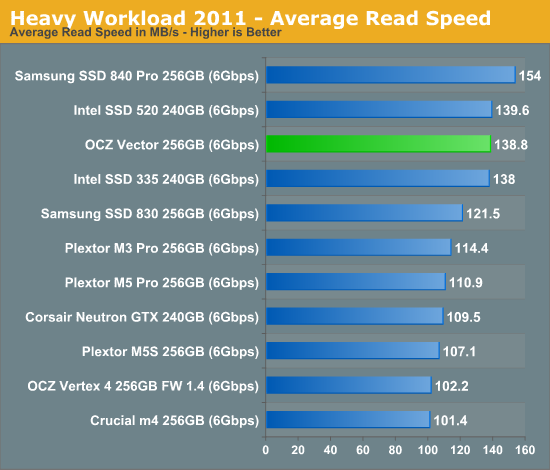
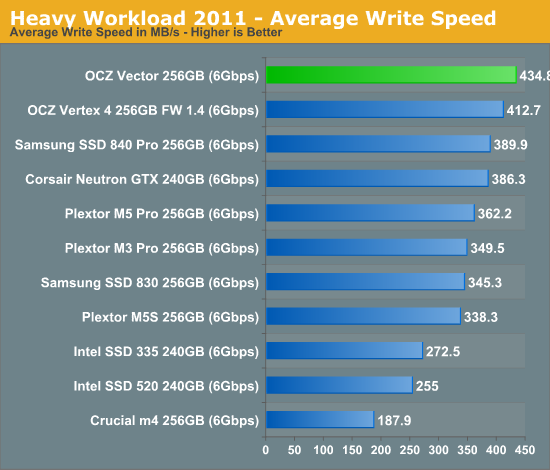
The next three charts just represent the same data, but in a different manner. Instead of looking at average data rate, we're looking at how long the disk was busy for during this entire test. Note that disk busy time excludes any and all idles, this is just how long the SSD was busy doing something:
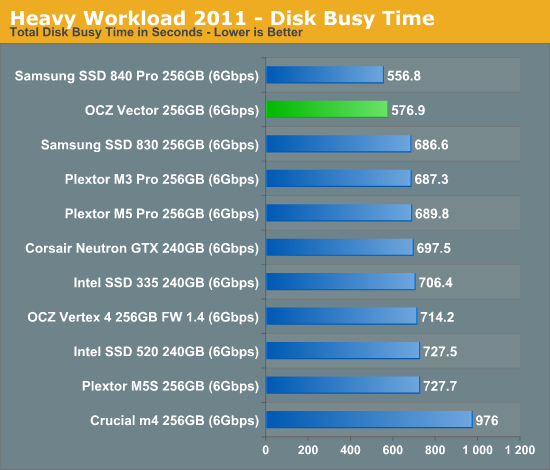
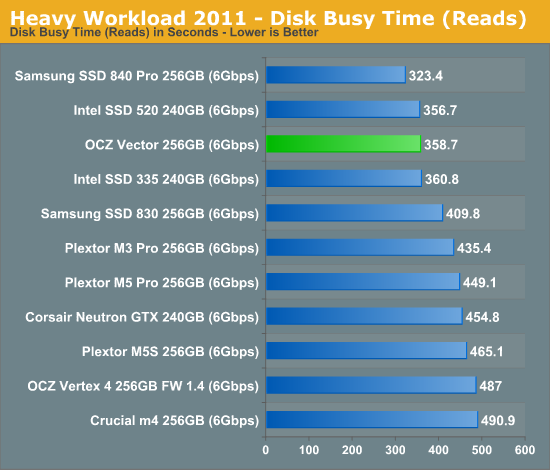
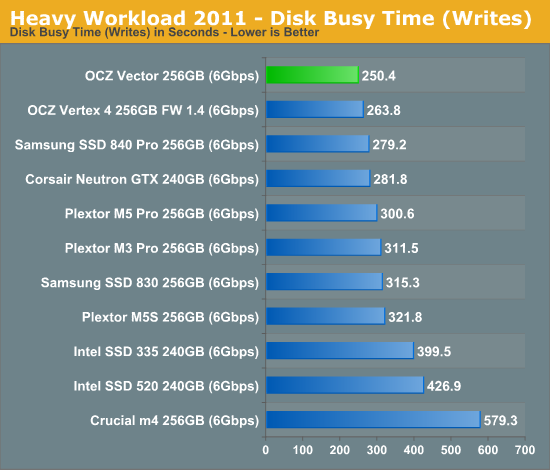










151 Comments
View All Comments
SodaAnt - Wednesday, November 28, 2012 - link
Its way too large for a msata drive, so it wouldn't fit anyways.somebody997 - Thursday, April 11, 2013 - link
Why is there an mSATA connector on the PCB anyway?somebody997 - Thursday, April 11, 2013 - link
The PCB is far too large for an mSATA drive anyway, so why have the mSATA connector?Anand Lal Shimpi - Wednesday, November 28, 2012 - link
That's likely a custom debug port, not mSATA.Take care,
Anand
Heavensrevenge - Wednesday, November 28, 2012 - link
Actually that connection is indeed a physically identically sized/compatible m-SATA connection. The problem is it's inability to actually plug in due to the SSD's general size or whether it's able to communicate with the typical m-SATA ports on mobos.http://www.pclaunches.com/entry_images/1210/22/tra... should give a decent example.
vanwazltoff - Thursday, December 20, 2012 - link
might be a sign of something else in the works from ocz like an msata cable to plug into it or something, maybe something even more awesome like double the band width by connected it to a ocz pci break off board. i guess we will seemayankleoboy1 - Tuesday, November 27, 2012 - link
I have a Vertex2 256GB SSD.Is it worth upgrading to a Vector or a Samsung840 Pro SSD ?
MadMan007 - Tuesday, November 27, 2012 - link
If you've got a motherboard with SATA 6Gb/s you would probably notice a difference. Whether it's worth it is up to you - do you do a lot of disk-intensive work to the point where you wish it were faster? While I'm the difference would be noticable, it might not be huge or worth spending $200+ on.MrSpadge - Wednesday, November 28, 2012 - link
Are you often waiting for your disk to finish tasks? If not it's not going to be worth it.Beenthere - Tuesday, November 27, 2012 - link
It's going to take more than a nice type written letter to resolve the many product and service issues at OCZ - if they stay in business over the next six to 12 months.FYI- A five year warranty ain't worth the paper it's written on if the company no longer exists. In addition a five year warranty does not mean that a particular product is any better than a product with a one year warranty. For each extended year of warranty, the product price increases. So you're paying for something you may or may not ever use.
In addition it's useful to read the fine print on warranties. Most state that you will receive a refurbished or reconditioned replacement if your product develops a defect. If you've ever seen some of the "reconditioned" or "refurbished" mobos from Asus or similar products from other companies, you'd never install them in your PC.
People reach many untrue conclusions about product quality based on the warranty.